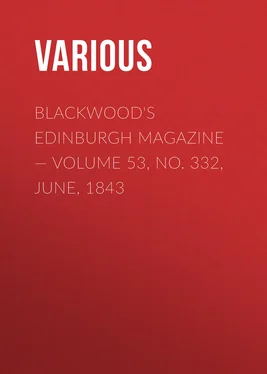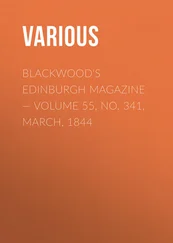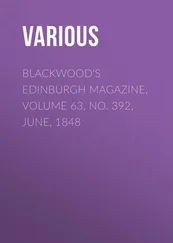Various - Blackwoods Edinburgh Magazine – Volume 53, No. 332, June, 1843
Здесь есть возможность читать онлайн «Various - Blackwoods Edinburgh Magazine – Volume 53, No. 332, June, 1843» — ознакомительный отрывок электронной книги совершенно бесплатно, а после прочтения отрывка купить полную версию. В некоторых случаях можно слушать аудио, скачать через торрент в формате fb2 и присутствует краткое содержание. Жанр: foreign_antique, periodic, foreign_edu, на английском языке. Описание произведения, (предисловие) а так же отзывы посетителей доступны на портале библиотеки ЛибКат.
- Название:Blackwoods Edinburgh Magazine – Volume 53, No. 332, June, 1843
- Автор:
- Жанр:
- Год:неизвестен
- ISBN:нет данных
- Рейтинг книги:4 / 5. Голосов: 1
-
Избранное:Добавить в избранное
- Отзывы:
-
Ваша оценка:
- 80
- 1
- 2
- 3
- 4
- 5
Blackwoods Edinburgh Magazine – Volume 53, No. 332, June, 1843: краткое содержание, описание и аннотация
Предлагаем к чтению аннотацию, описание, краткое содержание или предисловие (зависит от того, что написал сам автор книги «Blackwoods Edinburgh Magazine – Volume 53, No. 332, June, 1843»). Если вы не нашли необходимую информацию о книге — напишите в комментариях, мы постараемся отыскать её.
Blackwoods Edinburgh Magazine – Volume 53, No. 332, June, 1843 — читать онлайн ознакомительный отрывок
Ниже представлен текст книги, разбитый по страницам. Система сохранения места последней прочитанной страницы, позволяет с удобством читать онлайн бесплатно книгу «Blackwoods Edinburgh Magazine – Volume 53, No. 332, June, 1843», без необходимости каждый раз заново искать на чём Вы остановились. Поставьте закладку, и сможете в любой момент перейти на страницу, на которой закончили чтение.
Интервал:
Закладка:
"Again on the knight look'd the churchman old,
And again he sigh'd heavily,
For he had himself been a warrior bold,
And fought in Spain and Italy.
And he thought on the days that were long gone by,
When his limbs were strong, and his courage was high."
The news from France produced a sensation throughout England totally indescribable at the present day. Every tongue and every heart was full of it. It offered something for every mind of the million to seize on. Like a waterspout, such as I have seen sweeping over the bosom of the Atlantic, half-descending from the skies, and half-ascending from the deep; every second man whom one met gave it credit for a different origin, some looking at the upper portion and some at the lower; while, in the mean time, the huge phenomenon was blackening, gathering, and rushing onward, threatening to turn all above into darkness and all below into storm. It made the grand subject of parliamentary eloquence, and parliament was never more eloquent; it filled the speeches of the factious, it was hailed by the shouts of the multitude, and it disturbed the fireside with fear and hope, with wishing and wonder. It must be acknowledged that a vast quantity of this excitement was absolute folly; but, at the same time, there was a sincerity in the folly which redeemed it from ridicule. Nothing could be more evident than that this French patriotism was as theatrical, in the countless majority of instances, as the loves and sorrows of its stage. Yet, however the speeches might be got by heart, or the frippery and actors hired, the drame was powerfully performed; and all Europe sat by, giving it the tribute of its tears and its terrors. Even we of England, with all our more sober recollections that the heroes were ragamuffins, and the heroism imaginary, gave ourselves up to the illusion. I shall not say that I was wiser than the rest of mankind. I liked excitement, wherever it was to be found. The barriers to distinction were still too firmly closed against the youngest son of an embarrassed family, not to suggest many a wish for whatever chance might burst the gate, or blow up the rampart; and my first effort in political life was a harangue to the rabble of the next borough, conceived in the most Gallic style. Yet this act of absurdity had the effect of forwarding my views more rapidly than if I had become an aristocratic Demosthenes. My speech was so much applauded by the mob, that they began to put its theories in practice, though with rather more vigour than I had dreamed of. There were riots, and even some attempts at the seizure of arms; and the noble duke, our neighbour, had received a threatening letter, which sent him at full gallop to the Home Secretary. A note, by no means too gentle in its tone, was instantly despatched to my noble brother, enquiring why he did not contrive to keep the minor branches of his family in better order, and threatening him with the withdrawal of the county patronage. My demand of a commission in the Guards was no longer answered by the head of our house with astonishment at the loftiness of my expectations, and statements of the utter emptiness of the family exchequer. The result of his brief correspondence with Downing Street was a letter, notifying that his majesty was pleased to accept my services in the Coldstream.
I was enraptured, and my brother was enraptured, for we had both gained our objects. I had got rid of him and ennui. He had got rid of me, and the displeasure of the grand dispensers of place and pension. No time was lost in forwarding me to make my bow at the Horse Guards; and my noble brother lost as little time in making me put my hand to a paper, in which, for prompt payment, I relinquished one half of my legacy. But what cared I for money? I had obtained a profession in which money was contemptible, the only purse the military chest, and the only prize, like Nelson's, a peerage or Westminster Abbey. The ferment did not cool within the week, and within that period I had taken leave of half the county, been wished laurels and aiguillettes by a hundred or a thousand of the fairest of our country belles; and been wished a thousand miles off by the wise matrons, to whom the sight of a "younger son without house or land" is a nuisance, a kite among their family pigeons.
At that moment, however, all their dovecots were secure. I should not have spent a sigh on the Venus de Medicis had she sprung from her pedestal to enchant me. The world was open before me; and trite and trifling objects were no more to occupy my time. I felt like one who, after wandering all day through the depths of an American forest, suddenly reaches its border, and sees before him the boundless prairie, with its boundlessness still more striking, from the absence of any distinct object on which the eye could rest. What were horses, dogs, and country dinners, to the world of London and of life which now came in full, and, I will own it, extravagant vision before me? The ideas which I conceived of men and things, of my own fortunes, and the fortunate exercise of my own powers, were of an order which, in my calmer days, have often made me smile; yet what is the whole early life of man but a predisposition to fever? and I was then throbbing on the fiery verge of the disease.
I shall say but little of my first sensations on reaching London. My eyes and ears were in full activity. But the impression upon all who enter this mightiest of capitals for the first time, is nearly the same. Its perpetual multitude, its incessant movement, its variety of occupations, sights and sounds, the echo of the whole vast and sleepless machinery of national existence, have been a thousand times the subject of description, and always of wonder. Yet, I must acknowledge, that its first sight repelled me. I had lived in field and forest, my society had been among my fellows in rank; I had lived in magnificent halls, and been surrounded by bowing attendants; and now, with my mind full of the calm magnificence of English noble life, I felt myself flung into the midst of a numberless, miscellaneous, noisy rabble, all rushing on regardless of every thing but themselves, pouring through endless lines of dingy houses; and I nothing, an atom in the confusion, a grain of dust on the great chariot wheel of society, a lonely and obscure struggler in the mighty current of human life, which rolled along the sullen channels of the most cheerless, however it might be the largest, of capitals.
For the first week, I was absolutely unable to collect my thoughts. All that I learned was, to make my way through the principal thoroughfares, and know the names of her chief buildings. In later days, I took a more practical view of matters, and regarded them only as places in which the business of the hour was to be done. But in my first view, something of the romance and revival of my forest walks clung to me. I remember that, when I first saw the Horse Guards, to which, of course, one of my earliest visits was paid, I found no slight difficulty in thinking of it as only a remarkably clownish mass of brick and stone, crowded with clerks. To me it was the very palace of war; the spot from which the thunderbolts of England were launched; the centre and the stronghold of that irresistible influence with which England sways and moulds mankind. The India House was another of my reveries. I could not think of it as but a huge pile in a vulgar outlet of the city, as a place of porters and messengers loitering in gloomy corridors, of busy clerks for ever scribbling in nooks unvisited by the sun, or even of portly directors, congregating in halls encrusted with the cobwebs of centuries. To my eyes it was invested with the mystery and dignity of Orientalism. I thought of the powers by which rajahs were raised and overthrown, of the mandates which spread war and restored peace over regions wide as Europe, and a thousand times more brilliant. I had rambling visions of armies of elephants, superb cavalry, and chieftains covered with gold and diamonds. As I traversed the dusky halls, I thought of the will which pronounced the fate of kingdoms, the fallen glories of Aurengzebe, the broken sceptre of the Mahratta, and the crushed tiara of Mysore. Round me was the moving power of an empire, the noblest that the East has ever seen, and which, in the act of assuming additional greatness, by a contradiction to all the laws of extended conquest, was hourly assuming additional stability.
Читать дальшеИнтервал:
Закладка:
Похожие книги на «Blackwoods Edinburgh Magazine – Volume 53, No. 332, June, 1843»
Представляем Вашему вниманию похожие книги на «Blackwoods Edinburgh Magazine – Volume 53, No. 332, June, 1843» списком для выбора. Мы отобрали схожую по названию и смыслу литературу в надежде предоставить читателям больше вариантов отыскать новые, интересные, ещё непрочитанные произведения.
Обсуждение, отзывы о книге «Blackwoods Edinburgh Magazine – Volume 53, No. 332, June, 1843» и просто собственные мнения читателей. Оставьте ваши комментарии, напишите, что Вы думаете о произведении, его смысле или главных героях. Укажите что конкретно понравилось, а что нет, и почему Вы так считаете.












